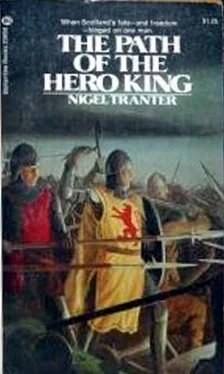Nevertheless, this was set battle, something that Bruce had set his face against, until now. And still would have avoided. But Pembroke, galled and frustrated by pin-prick defeats and his masters wrath, had issued a public challenge. He challenged the so-called King of Scots to stand, to act the man, the soldier, the knight, not die cut-throat brigand, to meet him in fair fight, and see how puissant he was then. All over the land this challenge had been trumpeted.
Bruce was fighting a battle for his peoples minds, as well as this physical warfare of flesh and steel. For that long-term and more abstract advantage, he felt that he must accept this English gesture, for once at least. And had chosen this Loudoun Hill, carefully, for his battle-ground, where Pembroke must pass.
All night they had worked, busy indeed, digging, cutting, carrying, die King labouring with the others. So that now, with battle joined, he could sit there, high above it all, with the morning sun streaming at his back, playing general, the King-and hating it.
Not that the battle was quite joined yet. Pembroke, the sun in his eyes, and riding slightly uphill at that, had formed his 3,000 into two great lines, with MacDougalls Lornmen racing along on the flanks. The van, with de Valences own banner, blue and white with red mart lets flying beside the Leopards of England in the centre, charging forward shoulder to shoulder, at an earthshaking canter, die fastest pace such heavily-armoured cavalry could achieve, in a blaze of colour and brilliance. Behind them, a quarter-mile back, die second line followed, meantime at a quiet trot, below Percys standard. Gloucester, with the main English infantry, should have been behind that again-but Bruce, by a series of feints and stratagems, had delayed the great body of foot coming through the hill passes, and they were still miles off.
Facing Pembrokes charging threat, below in die level grassy ground
that flanked die road-die main road, by die Irvines valley, from Ayr
to the east and north600 Ayrshire spearmen were drawn up, waiting in
three schiltroms, or boxes, their friezes of pikes projecting like
hedgehogs quills. However sure and disciplined they appeared, their
inadequacy in numbers was direly apparent. Jamies silken Douglas
banner flew over die central formation. Boyd and Fleming commanded on
either side of him.
The rest of Bruces people, apart from his own group standing there on the hill, were disposed in no such tidy or military formations on the two flanks. They looked something of a rabble indeed, all foot-for these flanks were no place for horses, even moss troopers garrons. Edward commanded on the right with 300;
Campbell with 200 on the left, the cateran Islesmen amongst them.
Their ragged ranks seethed and were never still-for the best of reasons. Few of them stood on ground firm enough to hold them up for more than a few seconds.
Bruce, an Ayrshire man himself, had selected this battlefield after much thought. Pembroke, from Ayr Castle, had challenged the Scots to meet him, if they dared, at or on his way to Bothwell, in Lanarkshire, where he was to hold a conference of English local governors and sheriffs-no doubt to deal with the rising loyalist tide. The vale of the River Irvine, through which his route threaded, tailed out into the side of this Loudoun Hill, and thereafter the road climbed to cross high open barren moorland for many miles. Heedfully he had chosen. The ground below him was flat for some distance, open, and covered with fine sheep-cropped turf, ideal for cavalry. And broad, fully 800 yards of it, from the western approach on either side of the road. But this pleasing stretch was set between two peat-bogs of black and green treachery and great extent, plain for all to see. What was not so plain, at least from the lower ground, the west, was that the firm ground in fact narrowed, not dramatically but steadily eastwards; so that, where the three schiltroms were sited, there was not 800 but barely 500 yards between the quaking margins. And there was still more to the site than that-blistered hands and aching backs testified to it, that morning. Stretching from side to side across it, at hundred yard intervals, deep and wide trenches had been dug-and then covered over lightly with scrub and branches thatched with turf. At a distance of more than a few yards these were practically indiscernible.
That front line of charging knightly might was a sight both to stir and strike terror.
Its ruin and disintegration was a shocking thing to watch, even for those it menaced. At first, only the keenest and most experienced eye could have perceived that something was amiss, as the extreme ends of the long line began to be forced inwards. In a charge of heavy cavalry, already close-packed, any major constriction can swiftly lead to trouble. The fine level front began to buckle and bend. At that pace and impetus it was not easy for the tight-knit ranks to give, to find room for their colleagues being pressed in on them. As a result, many on the flanks could neither draw up nor in, and were forced to hurtle on into the soft peat moss -with immediate disaster. And along the line generally the enforced huddling together at speed began to tell, and there was some collision, horses and riders overthrown, with others crashing over them. And steadily the firm ground narrowed.
De Valence of course did not fail to see the danger, and the remedy. His trumpets sounded and his captains waved back the flanks desperately, to turn the advance from a straight line into a wide wedge, a great spearhead. At a thundering charge this, though simple in theory, was no easy manoeuvre to accomplish, with 1,500 men involved; but these were superbly trained and disciplined cavalry, perhaps the finest in Christendom, and the difficult adjustment began to take shape, although not without losses.
It was just as this transformation was taking place that the centre of the line reached the first of the covered trenches. Perhaps Pembroke and his leaders, had they been less preoccupied with changing their formation, might have perceived the slightly artificial appearance of the ground immediately ahead, carefully as the Scots had sought to camouflage it. As it was, they crashed into the trap headlong, and into utter chaos. The ground gave way beneath the heavy chargers hooves, and down in hurtling ruin the flower of English chivalry fell, in a storm of flailing and breaking limbs, clashing armour and the screams of men and beasts.
Those ditches were a score of feet wide and a dozen feet deep.
There was no jumping them or avoiding them, and with the impetus of the advance and the weight behind, no drawing back.
Had it not been for the bodies piling in and filling up the gap, thus forming bridges, few would have got across.
As it was, probably more than half the van did win over that grim obstacle, in some fashion and in dire disorder. But it was the major leadership that had taken the brunt of it, and so lay lowest.
Only the lesser knights and captains found themselves left to take command. That they led the survivors in only slightly abated attack, said much for their nerve and spirit. But it was a ragged charge now.
In only a hundred yards, of course, and in inevitable impairment as a fighting force, they hit the second trench. Complete confusion reigned, and all forward movement ceased.
Throughout, MacDougalls Highlanders had been leaping and bounding,
light-footed, amongst the bogs and mosses on either side, Edwards and
Campbells motley companies awaiting them. At sight of the ruin
befalling their main host, they faltered somewhat. But they were
fearless fighters, and pressed on, if with less assurance.
In the slaistering mire of green slime and black peat broth, they clashed with their own fellow-countrymen in fierce hand-to-hand fighting.
Читать дальше












